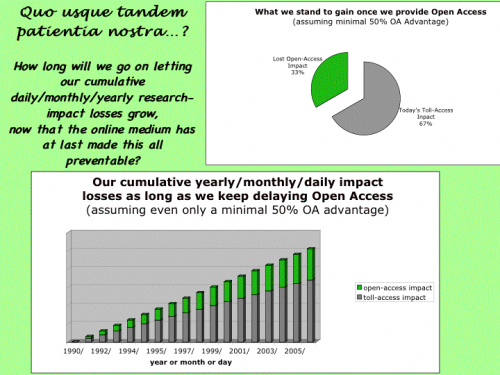[This is an updated version of a posting to the American Scientist Open Access Forum on Tuesday, 14 October 2003.]
When Harold Varmus's very timely and influential 1999
Ebiomed Proposal (a pot-pourri of ideas about publishing, journals, archiving, peer-review, and what would eventually come to be called "
Open Access [OA]") elicited
staunch opposition from its foes and
constructive criticism from its
friends -- but very little in the way of OA -- it led to the creation of the
Public Library of Science (PLoS), whose first action was to launch an
Open Letter, signed by
34,000 biologists worldwide, threatening to boycott their journals if they did not make their contents OA (within 6 months of publication).
Now SUPPOSE that -- in addition to performing the keystrokes required to sign the 2001 PLoS open letter (pledging to boycott journals unless they become OA journals), each of the 34,000 PLoS signatories had also performed (or deputized a librarian, secretary or student to perform for them) the few further keystrokes it would have required to make just one of their own year-2001 articles OA by self-archiving it, free for all, on the web.
THEN the number of OA articles (34,000) resulting from just that minimal act would already have doubled (to 60%) the percentage of OA articles (34%) among the approximately 55,000 Biology articles indexed by ISI in 2001; it would also have exceeded the total number of articles published by both BioMed Central and PLoS journals from 2001 to the present (c. 20,000)
And all at the cost of only a few keystrokes more per article than what it cost to sign the PLoS petition.
Yet the only thing researchers did in 2001 was to sign the PLoS Open Letter demanding that their journals give them OA. They then waited, passively, for the journals to comply with their demand for OA. [Most journals did not comply directly; of the 24,000 peer-reviewed journals that exist in 2005, only about 1700 of them (7%) have converted to (or already were) OA ("gold") journals; however, since 2001 over 90% of journals have also gone on to give author self-archiving their "green light" in response to researchers' expressed wish for OA.] Yet today most researchers still seem ready to keep on waiting, passively, for more OA journals to be created or converted, one by one. Meanwhile spontaneous self-archiving continues to hover at between 5-25%, depending on the field and year.
Is there not a note of inconsistency in this? Researchers feel they need and want OA enough to demand it from their journals, even threatening (rather idly, as it turns out to have been a bluff) to stop submitting to and peer-reviewing for the journals that decline to give them the OA they need and want so much. The benefits of OA are clearly demonstrated by the
objective evidence for the dramatic citation impact advantage provided by OA, so the needing and wanting have an unassailable objective basis: But do they have an equally unassailable subjective basis, if the needing and wanting are not sufficient to induce researchers to perform (or commission) for themselves the few keystrokes that are the only thing standing between them and 100% OA?
Researchers themselves have hinted at the resolution to this
koan: Yes, they need and want OA. But there are many other demands on their time too, and they will only perform the requisite keystrokes if their employers and/or funders require them to do it, just as it is already their employers and funders who require them to do the keystrokes to publish (or perish) in the first place. It is employers and funders who set researchers' priorities, because it is employers and funders who
reward researchers' performance. Today, about 15% of research is self-archived spontaneously but
95% of researchers sampled report that they would self-archive if required to do so by their employers and/or funders: 81% of them willingly, 14% reluctantly; only 5% would not comply with the requirement. And in the two objective tests to date of this self-reported prediction, both have fully confirmed it, with
over 90% self-archiving in the two cases where it was made a requirement (
Southampton-ECS and
CERN).
So an employer/funder
self-archiving mandate is obviously what is missing to resolve the koan. But what exactly needs to be mandated? Only the
keystrokes for depositing the final draft plus the
OAI metadata of the article in the author's
Institutional Repository (IR) immediately upon acceptance for publication, along with the strong encouragement to set access-privileges as "OA" (full-text access open webwide). Access to
over 90% of these articles can already be set as OA with the blessing of their publishers. The rest can be set to IR-internal access (for institutional employees, employers and funders) for the time being, but their metadata (author, title, journal, date, abstract, keywords) will still be as visible to all searchers and surfers webwide as those of the 90% that are already OA, allowing would-be users to email the author to request an eprint. Emailing eprints can bridge the gap until either the remaining 10% of journals give self-archiving their blessing or the author tires of doing the superfluous keystrokes to email the eprints and simply does the last keystroke to set access at OA. Either way, mediated OA will already be providing effective 100% OA as of the implementation of the keystroke-policy.
Such an immediate-deposit ("keystroke") policy -- leaving
no loopholes for any exceptions or delays -- is what
Research Councils UK (RCUK) needs to mandate. The rest of the
planet will follow suit. And Nature will take care of the rest.
Stevan Harnad
"
Why price boycott is the wrong strategy" -- (
Feb. 2000)
"
Petitions, Boycotts, and Liberating the Refereed Literature Online" -- (
Oct 2000)




